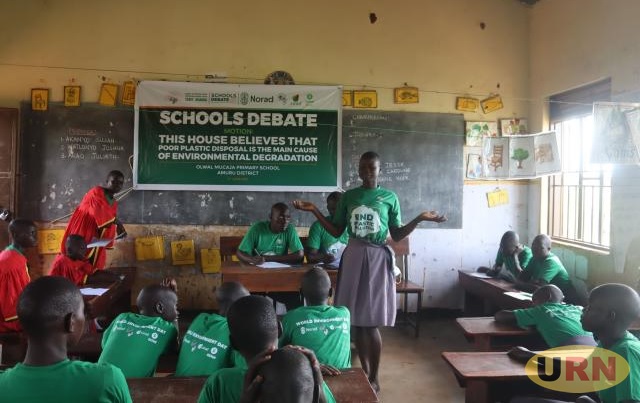
Amuru, Uganda | THE INDEPENDENT | Pupils of Olwal Mucaja Primary School in Guru Guru Sub-county, Amuru district on Thursday marked the World Environment Day with a powerful school debate aimed at raising awareness about the dangers of plastic pollution.
The debate held under the theme “This house believes that poor plastic disposal is the main cause of environmental degradation” drew pupils, teachers, parents and local leaders who gathered to hear the young voices speak on the most pressing environmental issue of the day.
World Environment Day was marked globally under the theme “End plastic Pollution”.
At Olwal Mucaja Primary School, the school debate was organized by the Eastern and Southern Africa Small Scale Farmers Forum (ESAFF) Uganda, an organization that brings together small scale farmers in partnership with the school management.
During the debate, both the proposition and opposition sides comprised of three debaters each tackled the motion with conviction and clarity, with each side wooing the other to join their camp in support of their discussions.
The proposition team argued that improper plastic waste disposals such as open littering of plastic bottles is the root cause of environmental degradation since plastics don’t rot and this affects micro-organisms that supports soil fertility and ultimately agriculture.
On the opposition side, other debaters contended that while plastic pollution is a serious environmental concern, other factors such as mining, harmful wastes from industries and deforestation too contribute to the degradation of the environment but not on plastics.
The one-hour debate was both competitive and enlightening, with the debaters both showing strong public speaking skills, research and team work. It ended with the team of two judges all teachers at the school declaring the proposition team winners citing their strong arguments.
Cosmas Apuke, the Head teacher of Olwal Mucaja primary School says the debate helps in creating awareness about the dangers of plastic wastes adding that through the pupils debating about it, the knowledge will cascade to the community.
Apuke says that through the debate, the school will also make improvements on how it handles plastic waste.
17-year-old Suzan Akanyo, a primary seven pupil and a member of the school Agro-ecology club, appealed to the community members to ensure they properly dispose of any plastic material after use to avoid plastic pollution.
“If you use those plastic bags, put them in a confined place which cannot pollute the environment, you should have dustbins at every corner we walk so that plastics are not scattered,” said Akanyo.
Julius Engwedu, the Programmes Assistant for livelihood development and climate resilience at ESAFF Uganda, says engaging young people in such debates is a more sustainable way of combating plastic pollution in the community.
Among key activities conducted by ESAFF Uganda in commemorating the World Environment Day was cleaning of Olwal Trading Center and Olwal Market, one of the rural areas in Amuru district grappling with plastic pollution. Others included the hands on plastic recycling training with the local farmers.
Local leaders in Amuru district, however, raised concerns during the community dialogue over the escalating improper plastic waste management in rural areas, attributing the problem to inadequate awareness among residents.
David Aliker, the Parish Chief of Amora Parish in Guru Guru Sub-county, says plastic materials remain one of the most used packaging materials in the rural communities, yet the locals don’t know how to properly dispose of them. Aliker notes that, unlike in the urban areas where a great number of people know the dangers of plastic waste, those in rural communities have limited knowledge and call for an urgent intervention for mass sensitisation.
Aliker explains that already within his community, the negative impacts of improper waste disposals are visible citing scattered discarded plastic bottles, and polythene bags, and loss of soil fertility which is affecting farming.
Samuel Peter Opiyo, the LCIII Councilor and Secretary for marketing and Production for Opok Parish says the biggest challenge with plastic waste management in his area is the lack of personnel specifically assigned for waste management. He also notes that the problem is further compounded by the lack of waste management infrastructure.
World Environment day was established in 1972 by the UN general Assembly to raise global awareness and promoting global action for the environment.
Globally, according to the UN Environment program (UNEP), over 430 million tons of plastics are produced annually, of which two thirds become waste after a single use while a staggering 11 million tons of waste enters the ocean and other water bodies.
****
URN
 The Independent Uganda: You get the Truth we Pay the Price
The Independent Uganda: You get the Truth we Pay the Price



